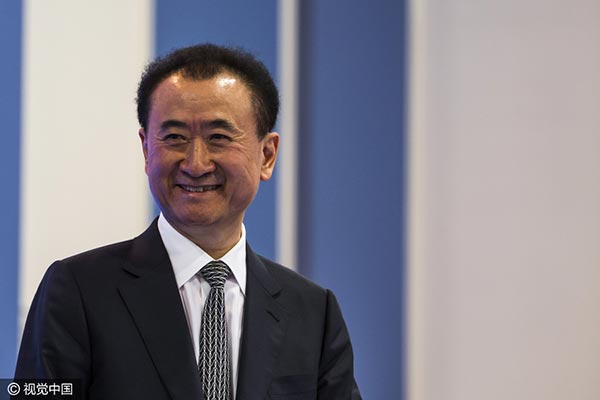A wish called Wanda flies into Hollywood
Updated: 2016-11-14 07:47
By Zhang Yuchen(China Daily)
|
|||||||||
 |
|
Wang Jianlin, chairman and president of Dalian Wanda Group, attends the Asian Financial Forum (AFF) in Hong Kong, Jan 18, 2016. [Photo/VCG] |
A Chinese realty tycoon's buying spree in the US entertainment industry has touched some American politicians' nerves. In its latest move, Dalian Wanda Group announced its $1 billion acquisition of Dick Clark Productions, a company which has organized many award ceremonies including the Golden Globe and Billboard Music awards.
The real estate conglomerate spent $2.6 billion to acquire AMC Entertainment, the second-largest cinema chain in the United States, in 2012, aside from investing billions of dollars in studios, theme parks and digital marketing. Wanda's expansion, however, is not restricted to the United States' market; it covers Europe and Australia, too.
Some US politicians are crying wolf over the influence of Chinese capital in Hollywood productions while some US lawmakers seek stricter rules to stop China's "cultural invasion". However, these investment initiatives are just a realty company's commercial moves against the background of China's economic transformation.
Wanda chief Wang Jianlin's address to Hollywood last month, mainly on the prospects of China's movie market in the coming years, should free critics of their unnecessary anxiety about the motive behind his purchase of Hollywood studios.
As the largest movie market after the US, China has seen continuous annual increase in box office, with last year's figure exceeding 44 billion yuan ($6.5 billion), up 50 percent compared with 2014. It is estimated the Chinese movie market will be worth $10 billion in 2018 and, subsequently, surpass the US as the largest film market.
The huge demand in China's movie market will have to be met with good content, for which Hollywood has to use creativity, which in turn will help it reinvent itself. Also, Chinese funds will facilitate the addition of Chinese factors to movies and eventually help productions make more profits.
With China's economy transforming from investment-driven to consumption-led growth, Wanda has accelerated its diversification from the housing market to other sectors. In an interview in September, Wang warned about the risk of the growing bubble in the housing market thanks to the skyrocketing housing prices, especially in the first- and second-tier cities.
Therefore, people who are worried about a Chinese cultural invasion of Hollywood have no reason to do. According to World Trade Organization rules, China's current quota restricts foreign movie imports to 34 titles a year on a revenue-sharing basis. And even though it will open up further in 2017-18, quality will still decide the fate of a movie in the market. And that is precisely why some domestic "black horses" have beaten Hollywood blockbusters at the box office in the past.
Moreover, Wanda's expansion in the global entertainment industry will create more jobs. For instance, Wanda's joint venture of Qingdao Movie Metropolis promises 40 percent rebate on some movies and TV productions provided they have Chinese elements along with two other requirements. The QMM, once it fully opens in 2018, will need professional management and talent mobility similar to Hollywood.
Wanda's entertainment move is purely commercial, and it should be seen as such.
The author is a writer with China Daily.
zhangyuchen@chinadaily.com.cn
Related Stories
Wanda pays $1b for Dick Clark TV company 2016-11-07 11:59
China's Wanda extends into Hollywood with Dick Clark deal 2016-11-04 23:36
Wanda wants part of 'Big Six' studios 2016-11-04 07:12
Wanda chairman unveils plan to invest billions in all six Hollywood studios 2016-11-03 01:26
Battle heats up as ex-Disney chief joins Wanda rival 2016-10-23 13:42
Wanda chief advises Hollywood 2016-10-20 11:03
Today's Top News
China, UK 'golden era' strengthens
UK business calls for a London-only visa system
First Chinese named as new Interpol chief
Chinese-Hungarian Friendship awards presented
Polls missed support for Trump
Superstars party with Jack Ma before shopping spree
Europe would elect Clinton: Poll
Obama, Trump meet at White House
Hot Topics
Lunar probe , China growth forecasts, Emission rules get tougher, China seen through 'colored lens', International board,
Editor's Picks

|

|

|

|

|

|







